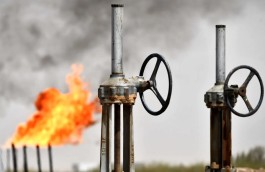Goldman Sachs warned that crude oil prices could rise by $20 per barrel if Iran's oil production is hit.
Dan Struyven, co-head of global commodities research at the bank, told CNBC that estimates indicate that if Iran's oil production of 1 million barrels per day is suspended, this will result in a significant increase in oil prices over the next year by about $20 per barrel, according to the Middle East News Agency, today, Saturday.
He added that this could happen on the assumption that the OPEC+ group of countries would refrain from increasing production, explaining that if major countries in that group, such as Saudi Arabia and the United Arab Emirates, compensate for some of the production losses, oil markets could see a smaller rise of just under $10 a barrel.
Energy analyst Saul Kavonic raised the possibility that Iran's Kharg Island, which produces 90 percent of the country's crude oil exports, could become a target, noting that the greater concern is that the move is the imminent start of a wider conflict that could affect transit through the Strait of Hormuz.
Other analysts said that if Israel strikes Iran's oil industry, supply disruptions in the Strait of Hormuz could become a concern, and Tehran has previously threatened to cut off oil flows through the strait if its oil sector is affected.
According to the US Energy Information Administration, the strait between Oman and Iran is a vital channel through which about a fifth of the world's daily oil production passes, and the waterway connects Middle East crude oil producers to major global markets.
US crude oil futures rose about 5% during trading on Thursday, and continued to rise again on Friday morning, amid fears that Israel might strike Iran's oil industry in response to the missile attack launched by Tehran this week.
Since the Israeli-Palestinian conflict began on October 7, 2023, there have been limited disruptions to oil markets, with prices remaining under pressure due to increased production from the United States and weak demand from China.
Iran, a member of OPEC, is an important country in the global oil market, producing about 4 million barrels of oil per day, and about 4% of the global supply could be at risk if Iran's oil infrastructure becomes a target for Israel, which is considering taking a counter-move.







































